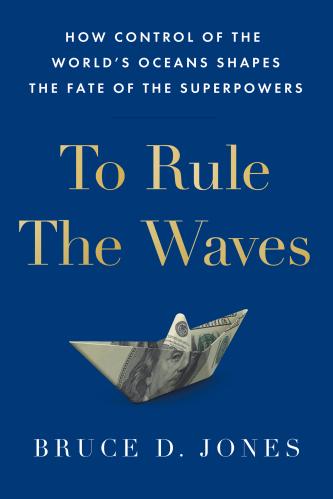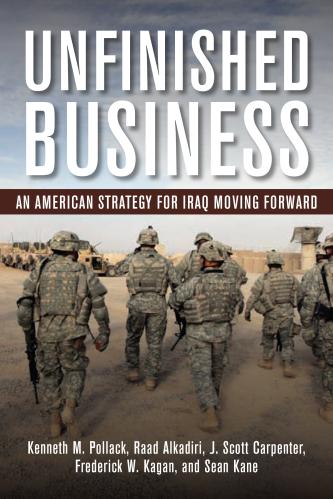The “inextricable linkage between our forward deployed forces and our domestic security and law enforcement agencies is absolutely essential to American security and homeland security,” said John Allen, president of Brookings, at a debate event on the changing role of America’s military. Allen, a retired U.S. Marine Corps four-star general and former commander of NATO and U.S. forces in Afghanistan, was joined on stage by two international security experts from the University of Notre Dame—Michael Desch and Eugene Gholz—and Brookings Nonresident Senior Fellow Mara Karlin, a former deputy assistant secretary of defense for strategy and force development.
The debate—the second in a series convened by Foreign Policy program at Brookings and the Charles Koch Institute, in partnership with Politico—was held at the University of Nevada, Las Vegas on December 11. It featured compelling exchanges of views on topics ranging from the deployment of American forces abroad, to Afghanistan, to the use of nuclear weapons, to military budgeting. The debate’s moderators were Susan Glasser—chief international affairs columnist at Politico—and Mahsa Saeidi, a reporter with KTNV Action News.
A sample of the debate appears in the video clips below. Download and listen to the audio or watch the full video here.
Many exchanges during the debate centered on the U.S. role in creating and leading the global alliance of democracies after World War II, and the continued presence of U.S. military forces around the world decades after the end of both that conflict and the Cold War.
Is America “running the world” or a stabilizing presence?
When Susan Glasser asked Michael Desch, who directs the International Security Center at Notre Dame, about a piece he authored in 2016 in which he speculated that a Trump foreign policy might involve “curbing our enthusiasm for trying to run the world,” Desch answered that “we’re addicted to primacy in running the world.” In response, Allen emphasized the “importance of the United States in the world today,” and noted that it’s not just about the military presence, but “it’s the presence of the United States as a transformational force in the world today.”
Can/should Europe “take care of itself”?
Much of the debate centered around the role and expansion of NATO, and whether or not the United States should still be doing the “heavy lifting,” as Desch called it, to respond to the rise of China and continued provocations by Russia. On the issue of countering Russian aggression, Associate Professor of Political Science at the University of Notre Dame Eugene Gholz asserted that “Europe of all the places in the world is an area that can take care of itself very well in the face of the kind of threat that might be posed by the Russians.” When asked if Europe can take care of itself without the United States, Allen, who was unambiguous in stating that Russia is a threat, said: “We shouldn’t even attempt to answer that question.” Watch to find out why:
Karlin added later that “it’s hard to imagine Russia being a benign state.”
What is the proper role of NATO?
Glasser teed up the panelists on the role of NATO. Desch said that “NATO still has a role as a pillar of the European security architecture,” but didn’t see the need for its expansion and argued that NATO member countries in Europe should share more of the burden. Allen argued that NATO is concerned not only with the defense of Western Europe, but also “the EU as a bloc of liberal democracies,” and called attention to NATO’s emerging role to “project stability” in the Middle East and North Africa. “That’s an important contribution of NATO in the future,” Allen said.
How has the contentious D.C. political environment affected resources for defense?
In an audience question-and-answer period, Saeidi relayed a question about Washington debates over the appropriate level of defense spending, where that money goes—whether to modernization of forces, or personnel, or new weapons systems—and the political process by which spending levels are set (sequestration, for example). To the question “how has the political environment in Washington affected Department of Defense resources to operate?,” Karlin emphasized that the a very large amount of U.S. defense spending is “not on cool high-end systems but on people,” and that the focus should be on modernization. Gholz argued that while modernization is important, we should “change the trajectory of the kind of defense spending that we have.”
What are we accomplishing in Afghanistan?
Sixteen years after U.S.-led forces toppled the Taliban-led government in Afghanistan that harbored Osama bin Laden and his al-Qaida operation that carried out the 9/11 terrorist attacks, and after 16 years of continued operations on the ground involving hundreds of thousands of U.S. and allied troops, what has been accomplished? Glasser put this question first to Allen, who as noted was commander of NATO and U.S. forces in Afghanistan from 2011 to 2013. Allen highlighted the ongoing “real challenges” throughout Afghanistan, but Desch replied: “Tell me how this ends.” Allen, comparing the important role U.S. forces have played in supporting South Korea’s development into an economically-vibrant and democratic nation, said that “a long-term presence isn’t something we should be afraid of.”
Are we succeeding at stopping terrorism abroad before it comes to the U.S.?
Glasser noted that one premise of projecting U.S. military forces abroad to places like the Middle East and South Asia is to stop terrorism there so we don’t have to stop it at home. “Have we succeeded at that?” she asked. Desch was direct: “Absolutely not.” Allen countered that “there is a very strong linkage between our forces overseas and our security forces in the United States.”
Karlin emphasized that this is “an important conversation to have with Congress and the American people.”
Do we have too many generals?
President Donald Trump criticized America’s generals during the presidential campaign, but installed many of them in key positions in his administration, including, most notably, Lieutenant General H.R. McMaster as national security adviser, retired General John Kelly as chief of staff, and retired General James Mattis as secretary of defense. Turning to Allen, Glasser asked, “do we have too many generals?” Allen, drawing on his own experiences as a retired general, affirmed that “we need to have civilian control of the military” but added that McMaster, Kelly, and Mattis are among the best strategic thinkers in the current administration.
America’s military is not the sole measure of American might
In his closing statement, Gholz argued for shifting U.S. strategy and our military approach to a more defensive posture, with less power projection abroad. Karlin argued that “the world is not self-regulating,” that “short of undergirding the system with U.S. military power, we will not have stability and security.” Desch noted that the world has changed much since the end of the Cold War in 1991, but our policy hasn’t. He criticized an assertive U.S. military posture, advocating instead “restraint, which is not isolationism … [but] is prudent and humble.”
Allen, in his closing remarks, said that America has been a great nation not because of America’s military but because of the idea of America. “But if we do pull back the military,” he said, “if we do under-resource the military, if we do ultimately concede spheres of influence to other rising powers, the nature of the world will change very dramatically, and not only will the world be a less safe place to live in, but the United States will be a less safe place to live as well.”
Other topics covered in the debate included dealing with the crisis in North Korea, the use of technology like drones, and nuclear weapons. Watch the full event here, and stay tuned for additional debates co-sponsored by Foreign Policy at Brookings and the Charles Koch Institute. The first debate was held on November 6 at Washington University in St. Louis.
The Brookings Institution is committed to quality, independence, and impact.
We are supported by a diverse array of funders. In line with our values and policies, each Brookings publication represents the sole views of its author(s).








Commentary
Highlights from a debate on the role of America’s military
December 18, 2017